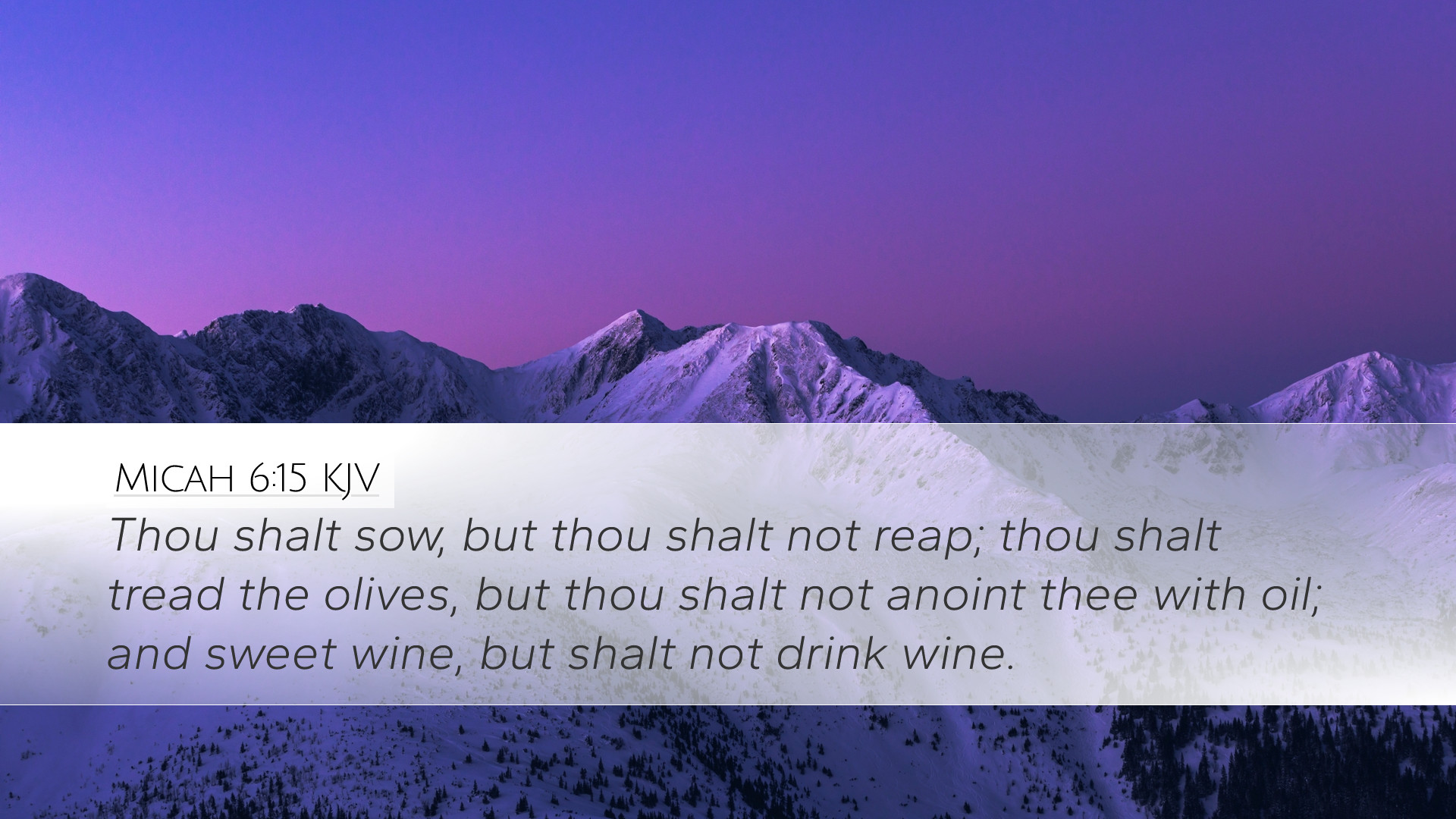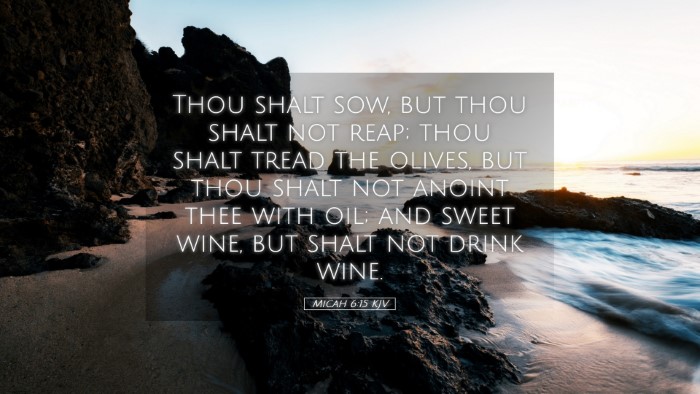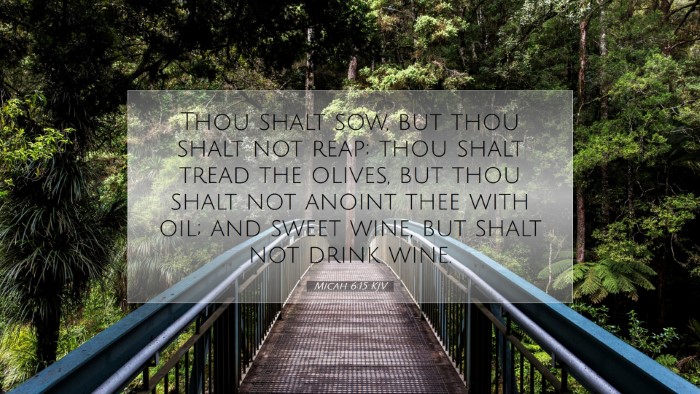Old Testament
Genesis Exodus Leviticus Numbers Deuteronomy Joshua Judges Ruth 1 Samuel 2 Samuel 1 Kings 2 Kings 1 Chronicles 2 Chronicles Ezra Nehemiah Esther Job Psalms Proverbs Ecclesiastes Song of Solomon Isaiah Jeremiah Lamentations Ezekiel Daniel Hosea Joel Amos Obadiah Jonah Micah Nahum Habakkuk Zephaniah Haggai Zechariah MalachiMicah 6:15
Micah 6:15 KJV
Thou shalt sow, but thou shalt not reap; thou shalt tread the olives, but thou shalt not anoint thee with oil; and sweet wine, but shalt not drink wine.
Micah 6:15 Bible Commentary
Commentary on Micah 6:15
Micah 6:15 (KJV): "Thou shalt sow, but thou shalt not reap; thou shalt tread the olives, but thou shalt not anoint thee with oil; and sweet wine, but shalt not drink wine."
This verse, nestled within the broader context of Micah's declaration of God's grievances against Israel, poignantly illustrates the themes of judgment, futility, and the consequences of disobedience. The prophet Micah serves as a voice of warning to both the people of Israel and Judah, compelling them to confront their moral and spiritual failures.
Historical Context
The socio-political landscape during Micah's ministry was marked by corruption, injustice, and rampant idolatry. Micah's prophetic message underscores the stark contrast between God’s holy standards and Israel’s transgressions. The dire predictions made in this verse are symptomatic of the impending judgment that would befall Israel due to their persistent rebellion against God.
Verse Breakdown
-
Sowing but Not Reaping
This phrase captures the essence of spiritual and agricultural futility. Matthew Henry notes that the people would engage in hard labor, yet they would see no fruit from their efforts. This reflects the reality of divine judgment where God withdraws His blessings.
-
Treading Olives but Not Anointing with Oil
Adam Clarke emphasizes the imagery of labor without reward. The olive symbolizes prosperity and good fortune; however, in this case, the laborers will exert themselves without receiving the benefits. This communicates a broader theme of unfulfilled expectations tied to their disobedience.
-
Sweet Wine but Not Drinking Wine
Albert Barnes interprets the absence of joy associated with not being able to partake in the fruits of one’s labor. Wine, often seen as a symbol of joy and abundance in biblical literature, is devoid of its celebratory significance due to judgment. The best of what was produced shall be lost, echoing the deep sorrow of the people.
Spiritual Significance
The verse provides profound reflections on the nature of divine retribution. It is a reminder to both contemporary readers and biblical scholars of the gravity of sin and the accompanying consequences. Micah’s message calls for introspection regarding the spiritual state of individuals and communities. It warns that unfaithfulness to God can lead to a life of toil without reward.
Theological Implications
Micah 6:15 serves as a poignant reminder of the covenantal relationship between God and His people. The consequences of sin are not only rooted in temporal experiences but also carry eternal implications. The inability to reap what was sown speaks to the notion of divine justice—a justice that prevails even amidst human attempts to evade accountability. The repeated refrain in Micah’s prophecies that God desires justice, mercy, and humility (Micah 6:8) is echoed in the emptiness described here.
Practical Application
For pastors and theologians, this verse offers a profound teaching point about the nature of human effort devoid of God’s blessing. It serves as a reminder of the importance of aligning one’s life according to God’s will. The futility described in this verse is a call to examine our motives, ministries, and the authenticity of our faith. Students of the Bible are encouraged to explore how the depicted outcomes of disobedience can reflect in contemporary settings where people seek fulfillment outside of God’s ways.
- Examine Personal Faithfulness: Reflect on areas of life where commitment to God aligns with divine expectations.
- Endure in Trials: Recognize that hard work in the face of adversity may not yield immediate rewards but can strengthen faith and character.
- Advocate for Justice: Engage actively in efforts that echo God’s call for justice and mercy within communities.
Conclusion
In summary, Micah 6:15 is a stark yet meaningful exhortation that captures the essence of God’s dealings with His people throughout history. The insights from public domain commentaries illustrate the consequences of turning away from divine expectations, culminating in a life marked by unmet promises and spiritual emptiness. For all who delve into the Scriptures, this passage urges a deeper understanding of the synergy between faithfulness to God and the blessings that accompany it.


